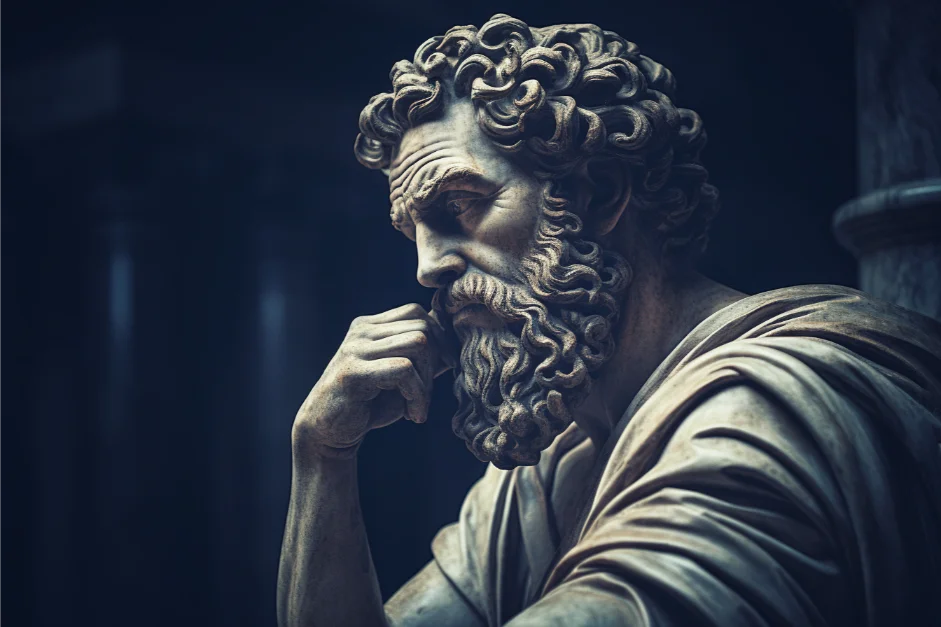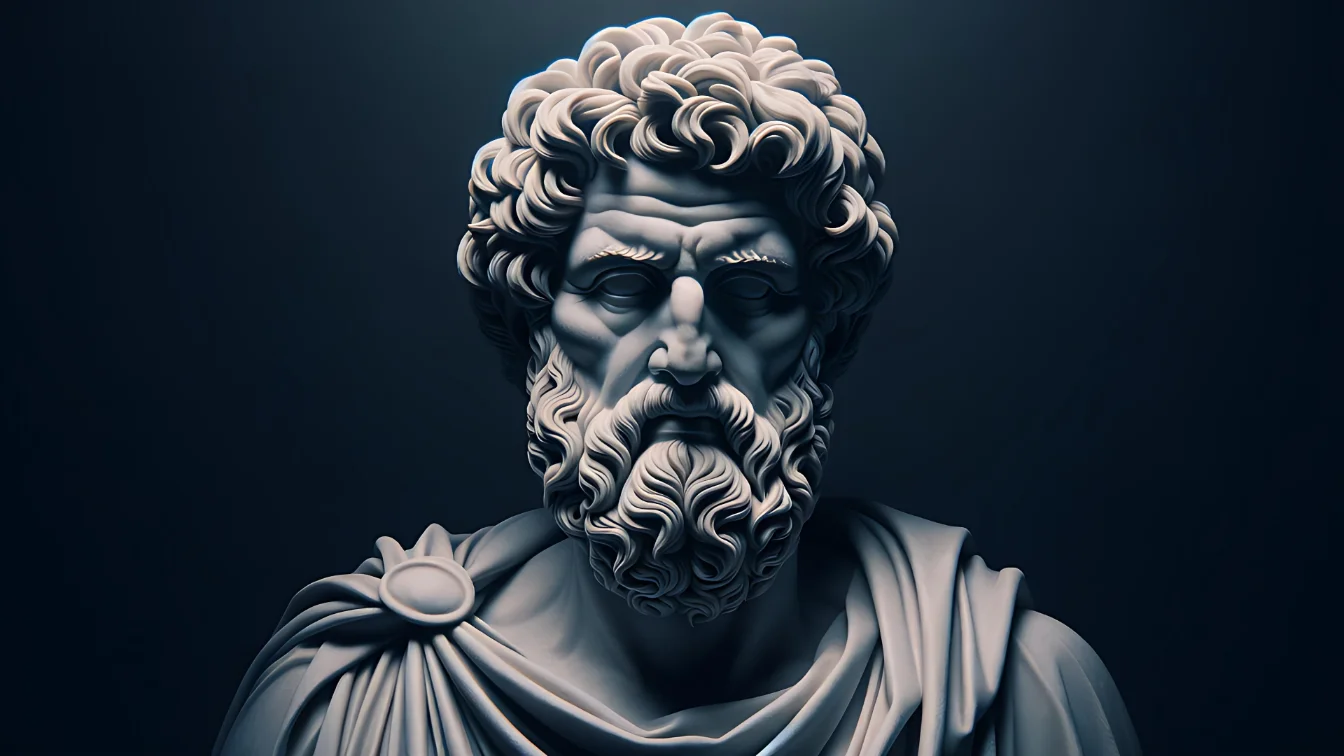If you’ve ever wondered, who is Epictetus?—congratulations. You’re about to meet one of the greatest minds in Stoicism. He wasn’t a king, a general, or a senator. He didn’t inherit wealth, and he wasn’t born into privilege. Instead, Epictetus started life in chains—literally.
So, what is Epictetus known for? He turned his hardships into wisdom. He transformed his suffering into philosophy. Today, centuries after his death, his teachings still guide people on how to master their emotions, focus on what they can control, and live a virtuous life.
The Life of Epictetus
Here are some basic questions about this famous Stoic philosopher, that you probably wonder.
When did Epictetus live?
He was born in 50 AD and died around 135 AD—meaning he witnessed some of Rome’s most turbulent years.
Where was Epictetus born?
In Hierapolis, Phrygia—modern-day Turkey. But Epictetus wouldn’t spend his early years freely roaming the streets. He was born into slavery.
Who owned Epictetus?
A wealthy and powerful man named Epaphroditus, a freedman who served under Emperor Nero. But despite being enslaved, Epictetus was allowed to study philosophy.
Who was Epictetus’ teacher?
The legendary Stoic philosopher Musonius Rufus. Under Rufus’s guidance, Epictetus developed a razor-sharp mind, even as his body remained bound in servitude.
Breaking Chains Without Breaking Spirit
Epictetus didn’t just talk about resilience—he lived it. His master, Epaphroditus, was known for his cruelty, and one day, he decided to test Epictetus’ endurance in the most brutal way possible. Gripping his leg, he twisted it with relentless force. Epictetus, already well-versed in Stoic acceptance, simply stated, “If you keep doing that, it will break.”
And then—it did.
Epictetus didn’t scream. He didn’t beg. He simply acknowledged what had happened. “I told you it would break.” That wasn’t defiance; that was a man who had already mastered the only thing he truly owned—his mind.
The injury left him crippled for life, but he never allowed it to define him. If anything, his physical limitations only sharpened his mind, proving that external circumstances had no power over inner strength.
Epictetus didn’t escape slavery in some dramatic fashion—he was freed. Why? Most likely due to the shifting political tides after Emperor Nero’s death in 68 AD, which led to policies that granted more enslaved individuals their freedom. But freedom, for Epictetus, wasn’t about legal status. He had already freed himself long before—through philosophy.

Epictetus’ Influence
After gaining his freedom, Epictetus didn’t rest. Instead, he opened a philosophy school in Nicopolis, Greece, where he began teaching others how to live virtuously, focusing on inner peace, self-control, and the importance of mastering one’s mind.
Epictetus didn’t just influence a handful of individuals; his teachings left a profound impact, most notably on Marcus Aurelius, the Roman emperor and author of Meditations. Though the two never met in person, Marcus deeply admired Epictetus’ wisdom and integrated his ideas into his own philosophy. Epictetus served as a guiding light for Marcus, shaping his approach to leadership and life.
Why was Epictetus banished?
Like many great philosophers, Epictetus found himself at odds with those in power. In 93 AD, Emperor Domitian exiled him, fearing the influence philosophers could have over the masses. Epictetus’ Stoic philosophy, which emphasized self-mastery, resilience, and independence, was seen as a threat to authoritarian rule.
Death and Legacy
Epictetus was born in 50 AD and lived a life that spanned the height of Roman power, passing away in 135 AD. Though the exact location of his burial remains a mystery, his teachings have endured for centuries, remaining as relevant today as they were in his time.
Epictetus died peacefully, a stark contrast to the emperors who feared his influence. His death marked the end of his physical presence, but his philosophy continued to live on, influencing thinkers, leaders, and individuals seeking to master their emotions and lead virtuous lives.
The Best Epictetus Quotes
“Circumstances do not make the man, they merely reveal him to himself.”
When life throws chaos at you, you have two options: complain, or conquer. Epictetus is saying that tough times don’t create your character—they just show you what you’re really made of.
“If you wish to improve, be content to be thought foolish and stupid.”
Stop worrying about what people think. Growth requires making mistakes, looking dumb, and stepping outside your comfort zone.
This is basically Stoic permission to post that cringey first YouTube video, launch that side hustle, or finally hit the gym without worrying about judgment.
“Do not seek to have events happen as you wish, but wish them to happen as they do happen.”
This is Amor Fati—the love of fate. Instead of resisting reality, embrace it. The more you fight life, the harder it pushes back.
Epictetus once told a student that a philosopher doesn’t complain about the weather; he prepares for it. So when your flight gets canceled? Stoicism says: “Great! More time to read.”
“No man is free who is not master of himself.”
You think freedom is about doing whatever you want? Nope. True freedom is mastering your mind. You can’t control others, the economy, or the next viral meme. But you can control yourself.
Harsh truth: If your emotions control you, you’re a prisoner—even if you’re not behind bars.
“You are a little soul carrying around a corpse.”
Brutal. But effective. Epictetus is reminding us that we’re not our bodies—we’re our choices. Our desires, fears, and complaints? All temporary. What matters is how we act.
You worry about looking good for Instagram, but one day, your body will be dust. Focus on making an impact instead of obsessing over aesthetics.
Should You Read Epictetus? Absolutely.
If you’re wondering, is Epictetus worth reading?—the answer is a resounding YES. His books Discourses and The Enchiridion (aka The Handbook) are life-changing.
Where to start? Begin with The Enchiridion—short, sharp, and packed with wisdom. If you want to go deeper, read Discourses.
Epictetus isn’t just a philosopher. He’s a personal trainer for your mind. Read him, apply his wisdom, and become unshakable.




